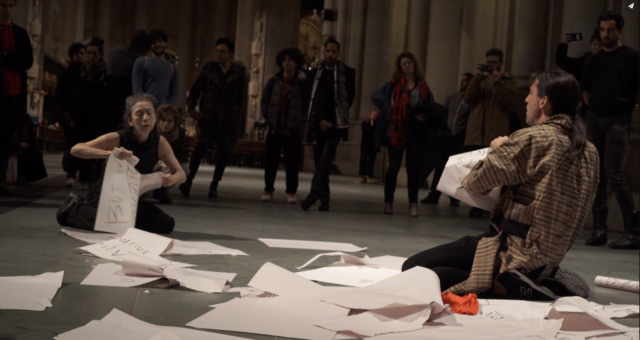
Eiko Otake and Iris McCloughan will team up again for “The Duet Project” at NYU Skirball
Who: Eiko Otake, Ishmael Houston-Jones, DonChristian Jones, Margaret Leng Tan, Iris McCloughan
What: “The Duet Project”
Where: NYU Skirball, 566 LaGuardia Pl. at Washington Square South
When: April 15-17, $35
Why: Following decades of dancing with her husband, Koma, in 2014, after Koma injured his ankle, Eiko Otake began exploring solo work as well as duets with other collaborators. In 2017 she launched “The Duet Project: Distance Is Malleable,” teaming up with a wide range of artists, posing the questions “How can two artists collide and return changed but whole? How can two individuals encounter and converse over their differences with or without words? How can we express both explicitly and implicitly what each of us really cares about?” Among those she’s worked with are painter Beverly McIver, filmmaker Alexis Moh, choreographers Merián Soto and Ann Carlson, dancer Chitra Vairavan, musician Ralph Samuelson, and photographer and historian William Johnston. In her choreographer’s note, Eiko explains, “In my new ‘Duet Project: Distance Is Malleable,’ I work with a diverse group of artists, living and dead. Collaborators come from different places, times, disciplines, and concerns. Together, we try to maximize the potentials of our various encounters so as to reaffirm that distance is indeed malleable.”
“The Duet Project” is now making its New York premiere April 15-17 at NYU Skirball, where Eiko’s unique experiments continue with choreographer, curator, and improvisor Ishmael Houston-Jones, painter, rapper, and organizer DonChristian Jones, avant-garde pianist Margaret Leng Tan, and poet and performance maker Iris McCloughan. As Eiko also explains, “This endeavor is as much about conversation as it is about self-curation, developing instincts, desires, strategies, and tools for encounters with or without words. It is also about developing urges, hesitations, and resistance by looking at each other and taking time. Being physically and mindfully together is memory making. Every encounter is to affirm living and also to prepare for one’s inevitable leaving. My body is always leaning forward to the next encounter.”